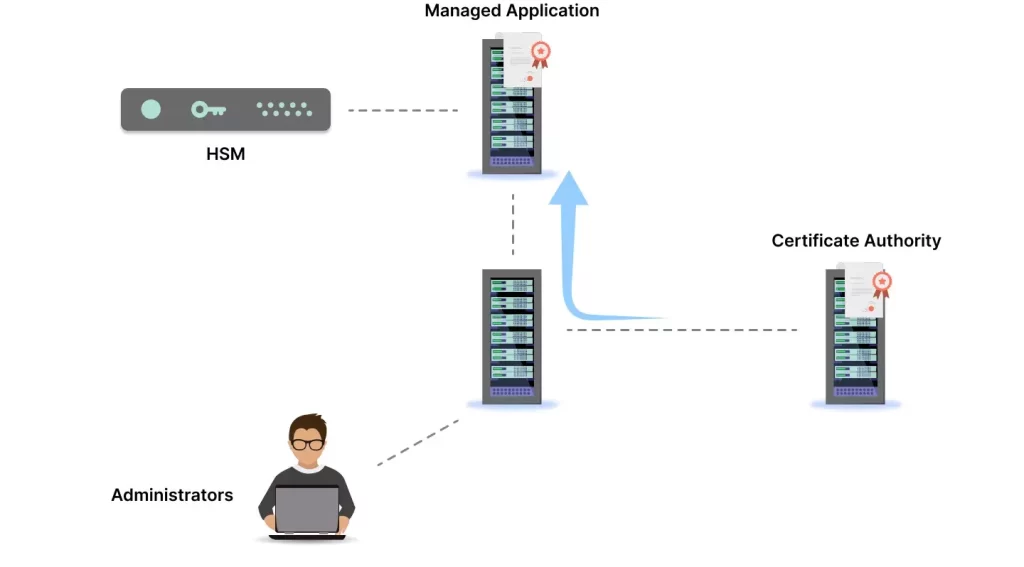A Hardware Security Module refers to a tamper-resistant hardware device meant to strengthen the security of cryptographic keys. It is a special “trusted” device that can perform diverse cryptographic operations in a trusted environment. These devices are ideal for performing decryption, encryption, and authentication for the appropriate use of any application, database, and identity while verifying digital signatures. So, these are the cryptographic processors meant for safeguarding and managing a company’s digital keys.
Companies worldwide are keen on gathering and storing consumer data for multiple reasons. One of the reasons for maintaining such a massive pool of sensitive data and information is to get a better insight into customer behavior and preferences.
Enterprises are forever interested in understanding user interaction and demands using data analytics. So, it forms one of the driving factors in making a more substantial digital presence in the market. Also, it enables businesses to analyze their customer preferences while getting proper feedback and review, thereby pumping up the entire ballgame of offering user-centric services in the market.
But maintaining such a vast data pool is risky for any business. Data and information, even stored in your cloud or your cryptographic keys, will still be prone to cyber threats and fraud. So how do companies mitigate the risks of such thefts and keep their customer data for prolonged periods? Let’s explore a unique solution that can be a beneficial and highly secure option for companies to safeguard data without many complications.

HSM Devices: Can It Protect Your Data?
HSM, or Hardware Security Module, refers to the secured and dedicated hardware meant for offering high-end security to your cryptographic keys. These are the ones that might seem like a hefty investment for your business initially. However, given the immense benefits and detailed security features, these HSM devices seem to be one of the best investments for any firm.

How Can an HSM Device Protect Your Data?
HSM devices are known for securing your cryptographic system and mostly work via:
- A private or secret key
- Protection against the key extraction
- A cryptographic engine
Typically, the HSM is responsible for containing both the cryptographic engine and key. However, here the sensitive secret key need not leave the HSM confinement.
So how does it function? Well, the data that needs to be decrypted or encrypted only wanders in and out of the HSM device. So, you see, since the secret key cannot leave the HSM setup, hence one cannot gain any remote access to its design.
What do you do when the attacker has physical access to your company’s HSM? In that case, these HSMs are available in different security grades. They range from mere primary forms to advanced protection levels as well. Generally, you can find four levels, including:
- Level 1 which refers to no individual physical security mechanisms
- Level 2 involves tamper-evident seals or coverings that need to be broken to gain access
- Level 3 consists of the robust enclosures along with tamper-detection or response circuitry
- Level 4 refers to the advanced form, where the penetration of the cryptographic module enclosure is highly sensitive to being detected merely by the fluctuations occurring due to changes in the module’s voltage and temperature operating ranges

So, these HSM devices are pretty helpful in offering excellent security to your cryptographic keys. But is it wise enough to make this investment for your company? Do these HSM devices provide significant benefits? Let’s get a closer look at how these devices can boost your company’s productivity and profits:
Purpose Of HSM
Companies are primarily interested in using HSM devices to hide their cryptographic keys, digital keys, and certificates. However, keeping the security top-notch is the priority for every organization. So, HSM finds utility in protecting identities, data, information, and transactions within the network by strengthening the overall encryption process.
Therefore, this tamper-resistant, secured cryptographic processor is often considered the Root of Trust, which can generate and protect the life cycle of your cryptographic keys. In addition, it is responsible for providing an advanced level of security in terms of integrity and confidentiality while processing sensitive information.
Security Comes First
The fundamental reason behind using HSM devices in offices is to provide one of the top levels of security against any external threats. Moreover, companies using such solutions can be considered the best way to protect sensitive data and information from malicious hacks.
Are You Transparent About Storing Customer Data?
Companies need to be transparent while asking for personal and sensitive information from their customers. In addition, they need to be serious about encrypting the platform while data is transferred, so HSM devices are the blessings here. With the appropriate integration of these devices, companies can assure their audiences about their dedication to safeguarding their information, especially the ones involving personal and payment data.
All In One Place
Keeping your cryptographic keys all in one place is essential and is possible due to HSM devices. HSM makes sure to keep the key, making it easier to safeguard and track as and when required. So, since the key won’t leave the device, it diminishes the probability of cyber threats.
Tamper-Proof Protection
Most of the HSM devices are tamper-resistant, while some might be tamper-evident. Therefore, it ultimately depends on their specific attributes, which adds to the security level offered by the devices. Due to such configuration, it can provide a high level of protection, unlike any particular software.
Ease Your KMS
KMS, or Key Management Service, is required for creating and managing cryptographic keys and their functions across different platforms. It involves the generation, use, storage, crypto-shredding, exchange, and replacement of these digital keys, throughout their lifecycle. With the appropriate integration of KMS, the companies can easily create as well as control the keys needed for their cryptographic operations.
These devices are the ideal ones that help organizations to ease the entire key management while maintaining proper compliance with the industry standards. However, the HSM devices are highly efficient in their tasks and can automate the KMS activities while reducing manual labor.
One crucial point to note here is that many companies still believe they can encrypt data without using HSM. Although it might be true in a few cases, it isn’t recommended for handling critical data and information.
Security Standards
Finally, if you are keen on investing your company resources in HSM, it is time to understand the security standards needed for the same. Since these modules play significant roles in keeping your data safe, it is essential to refer to the security standards to ensure their efficacy.
One of the standards to refer to here is the Federal Information Processing Standard Publication 140-2, also called FIPS 140, responsible for offering third-party assurance for a minimum strength level for any cryptographic device. Apart from this, the PCI or Payment Card Industry Council also has defined its set of requirements when it comes to using the HSM devices for payment data.

Is Your Organization Secure?
If your company encrypts data regularly or handles these crypto keys, it is time to invest in HSM. These devices give you a scalable option to store unlimited private keys while keeping up with the updated government compliances like PCI DSS, GDPR, HIPAA, and more.
If you need a permanent secured solution to offer high-speed cryptographic technology with low latency while protecting your critical information, HSM is the answer for you. So, when are you going to secure your organization’s data?





